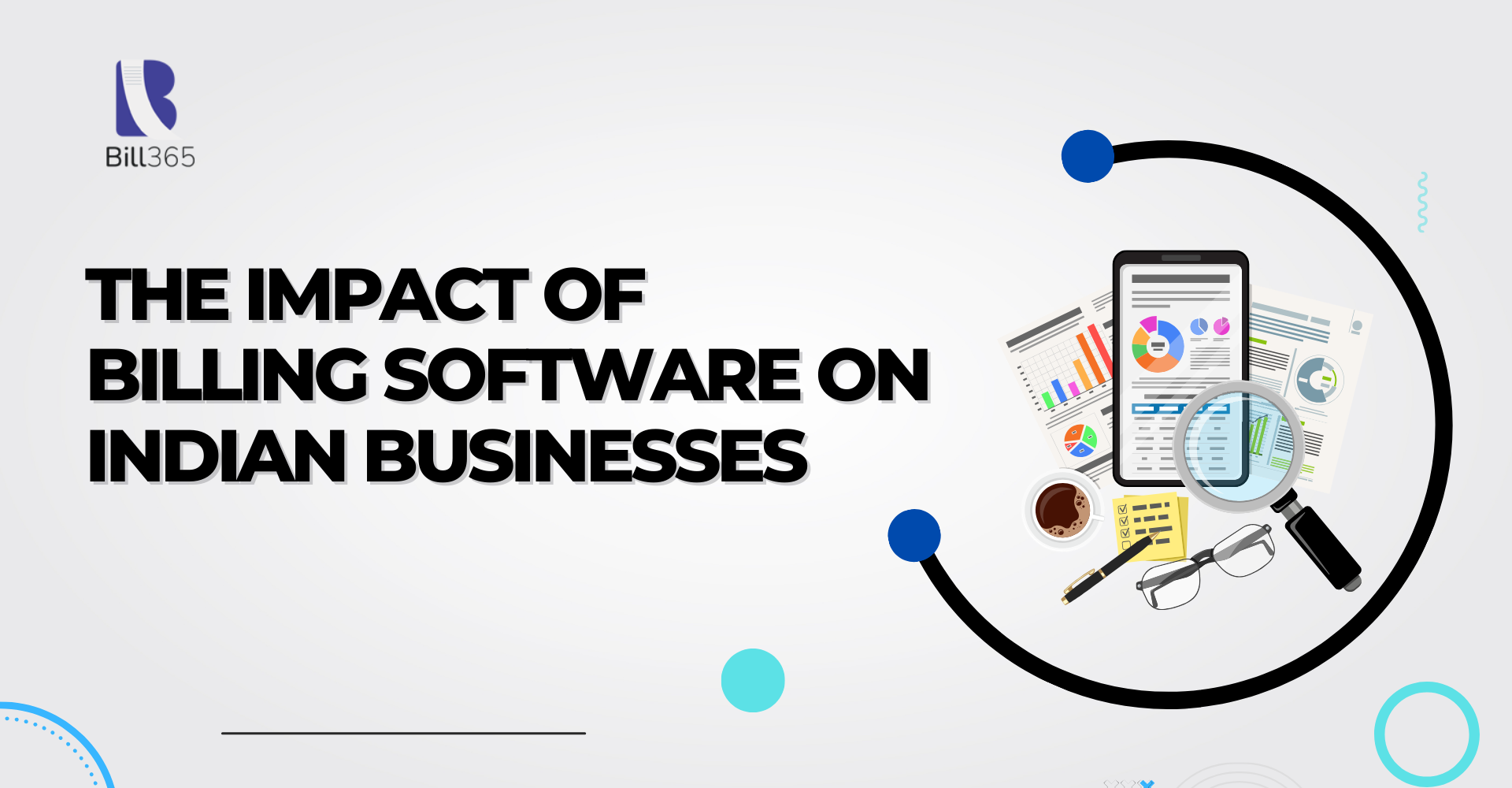
The Impact of Billing Software on Indian Businesses
In today’s rapidly evolving business landscape, efficient billing systems are crucial for success. Billing software for Indian businesses has emerged as a transformative tool, streamlining operations and enhancing accuracy. With the advent of digitalization and GST compliance, businesses in India are increasingly adopting advanced billing solutions to replace traditional, error-prone methods. This software automates invoicing and integrates with inventory management, ensuring seamless transactions and regulatory adherence.
From small startups to large enterprises, billing software empowers organizations to improve cash flow, reduce administrative burdens, and deliver better customer experiences. By leveraging these modern tools, Indian businesses can focus on growth and innovation while maintaining financial transparency.
Evolution of Billing Systems in India
The evolution of billing systems in India reflects the country’s broader journey towards digital transformation. Traditionally, businesses relied on manual billing methods, including handwritten invoices and paper-based records. While these processes were familiar, they often led to errors, inefficiencies, and compliance challenges. With India’s economic growth and increasing transaction volumes, the need for more efficient billing methods became evident.
The introduction of computers in the 1990s marked the first shift towards digitization, but the real transformation began with the widespread adoption of digital technologies and the implementation of the Goods and Services Tax (GST) in 2017. This new tax regime emphasized transparency and compliance, making it essential for businesses to adopt automated billing solutions. Billing software for Indian businesses emerged as a crucial tool to meet these regulatory requirements, offering features like automated tax calculations, error-free invoicing, and real-time data management.
Today, billing software for Indian businesses not only simplifies invoicing but also integrates with other financial systems, improving efficiency and reducing operational costs. This evolution has empowered businesses to maintain accurate records, comply with tax regulations, and enhance customer trust. As technology continues to evolve, billing systems in India will become even more sophisticated, supporting the country’s growing digital economy.
3 Key Features of Modern Billing Software
Modern billing software offers a range of advanced features designed to streamline business operations and enhance efficiency. Here are the top three key features that provide significant benefits for Indian businesses:
1. Automated Invoicing and Payment Tracking
Modern billing software streamlines the invoicing process by automatically generating invoices based on predefined templates and transaction data. It can schedule recurring invoices, apply taxes, and send payment reminders, reducing manual effort and human error.
For Indian businesses, this ensures timely billing and improves cash flow management. Automated payment tracking provides real-time updates on pending dues, helping businesses maintain better financial control.
2. GST Compliance and Tax Calculation
One of the most crucial features for Indian businesses is automated GST compliance. The software calculates applicable GST rates based on transaction details, ensuring accuracy.
It generates GST-compliant invoices and detailed tax reports, simplifying the filing process. It reduces errors and penalties, ensuring compliance with Indian tax regulations. Time and resources are saved when tax management is seamless, allowing companies to focus on growth.
3. Integrated Reporting and Analytics
Modern billing software offers comprehensive reporting tools that provide insights into sales, expenses, and outstanding payments. Customizable reports help businesses monitor performance, identify trends, and make informed decisions. Analytics dashboards present data visually, enhancing clarity and understanding. For Indian companies, these insights are invaluable for strategic planning and resource allocation, contributing to increased efficiency and profitability.
10 Advantages of Billing Software for Indian Businesses
Here are the 10 advantages of billing software for Indian businesses which are mentioned below:

1. Enhanced Efficiency and Accuracy
Billing software automates repetitive tasks such as invoice generation, payment tracking, and tax calculations. This reduces human error, ensuring greater accuracy in financial records. Indian businesses, particularly those managing large transaction volumes, benefit from faster processing and fewer discrepancies.
It is possible to save businesses valuable time and resources by streamlining these operations, enabling employees to focus on strategy. This efficiency not only improves workflow but also minimizes costly mistakes, contributing to smoother business operations and better customer service.
2. Simplified GST Compliance
With India’s Goods and Services Tax (GST) system in place, compliance is a critical aspect of business operations. Billing software for Indian businesses simplifies GST calculations by automatically applying the correct tax rates based on the transaction type and location.
It generates GST-compliant invoices and prepares detailed reports required for filing returns. This reduces the burden of manual compliance checks and ensures that businesses avoid penalties or audits. Such features are particularly beneficial for small and medium enterprises (SMEs) that may lack dedicated tax teams.
3. Cost-Effectiveness
Investing in billing software proves cost-effective in the long run. It reduces the need for manual labor, paper-based records, and physical storage, cutting down operational expenses. Many modern solutions offer affordable pricing models, making them accessible to small and medium-sized enterprises.
The automation of billing processes allows businesses to allocate resources more efficiently and reduce errors that could result in financial losses. Additionally, comprehensive analytics help identify cost-saving opportunities, making the software an invaluable tool for enhancing profitability in competitive markets.
4. Improved Cash Flow Management
Billing software helps businesses maintain a healthy cash flow by automating invoice generation, tracking payments, and sending reminders for overdue bills. It ensures that invoices are issued promptly, reducing delays in payment collection. Real-time monitoring of outstanding dues provides clear insights into financial status, enabling better cash flow management.
For Indian businesses, especially SMEs with limited capital reserves, timely payments are crucial. As a result of improving cash flow, billing software contributes to sustainable growth and financial stability, reducing the reliance on external funding.
5. Enhanced Customer Experience
A streamlined billing process leads to faster, more accurate invoicing, improving customer satisfaction. The billing software allows businesses to customize invoices, include detailed breakdowns, and provide digital copies, which customers appreciate.
It can also facilitate multiple payment options, enhancing convenience for clients. Clear, transparent billing builds trust and strengthens customer relationships. For Indian businesses in competitive sectors such as retail and services, delivering a seamless billing experience can set them apart from competitors, fostering loyalty and repeat business.
6. Seamless Integration with Other Systems
Modern billing software can integrate seamlessly with accounting, inventory management, and customer relationship management (CRM) systems. This ensures that all financial data is synchronized across various departments, reducing the need for manual data entry and minimizing errors. Integration enhances overall business efficiency by providing a unified view of operations. For Indian businesses, particularly those managing complex supply chains, these integrations enable better decision-making and resource management. Streamlined workflows lead to more accurate reporting and improved operational control.
7. Comprehensive Reporting and Analytics
Billing software offers robust reporting and analytics tools that provide valuable insights into business performance. Detailed reports on sales, outstanding payments, and customer transactions help identify trends and areas for improvement. For Indian businesses, these insights are crucial for strategic planning and decision-making.
Analytics can also track tax liabilities and ensure compliance with GST regulations. By understanding financial patterns, businesses can optimize pricing strategies, manage resources more effectively, and identify growth opportunities, ultimately enhancing profitability and competitiveness.
8. Data Security and Compliance
Billing software ensures that sensitive financial data is stored securely, often using encryption and advanced access controls. This protects against data breaches and unauthorized access, which is crucial for maintaining customer trust.
Many software solutions comply with Indian regulatory standards, ensuring that businesses meet legal requirements for data protection and financial reporting. For Indian businesses handling large volumes of confidential information, robust security features are essential. Secure billing systems reduce the risk of fraud and financial loss, providing peace of mind for business owners.
9. Scalability for Business Growth
Billing software is designed to scale with business growth. Whether a company expands its product line, enters new markets, or increases transaction volumes, the software can handle these changes without performance issues.
For Indian businesses, especially startups and SMEs with ambitious growth plans, scalability is vital. Cloud-based solutions, in particular, offer flexible storage and processing capabilities. As businesses evolve, billing software can be customized to meet changing needs, ensuring that the billing process remains efficient and aligned with organizational goals.
10. Environmental Sustainability
Billing software promotes environmental sustainability by reducing the need for paper-based invoicing and record-keeping. Digital invoices, receipts, and reports not only save paper but also reduce the energy and resources required for printing and storage. Indian businesses adopting eco-friendly practices can lower their carbon footprint while also cutting operational costs.
This aligns with growing consumer demand for environmentally responsible businesses. Implementing digital billing systems demonstrates a commitment to sustainability, enhancing the company’s reputation and attracting eco-conscious customers and partners.
Conclusion
Adopting the best billing app in India can significantly transform the way Indian businesses handle their financial operations. These modern solutions are not only easy to use but also streamline invoicing, ensure GST compliance, and provide valuable insights through advanced reporting. With features like automated payment tracking and enhanced data security, billing software saves time, reduces errors, and boosts efficiency. For business owners looking to stay competitive and compliant, investing in reliable billing software is a smart move that promotes growth, financial transparency, and customer satisfaction. Try the best billing app today and experience the difference!
FAQs
1. Why is billing software important for business?
Billing software streamlines invoicing, tracks payments, and ensures accurate financial records. It reduces human errors, improves cash flow management, and saves time, enhancing overall efficiency and compliance for businesses.
2. What is GST billing software?
GST billing software automates the creation of GST-compliant invoices, calculates applicable taxes, and generates detailed reports. It simplifies the GST filing process and ensures businesses adhere to Indian tax regulations.
3. What is the main purpose of billing?
The main purpose of billing is to record sales transactions, generate invoices, and collect payments. It ensures accurate financial documentation, facilitates cash flow, and maintains transparency between businesses and their customers.
